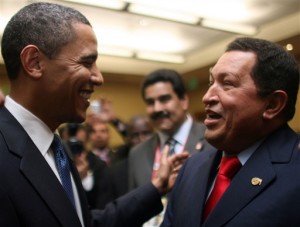
It finally happened…the moment we’d all been waiting for! After years of strained relations in which George Bush would scarcely say his name, Venezuelan President Hugo Chavez at last got the respect he deserves from a US president.
Those of you who’ve hoped for improved US – Venezuela relations all these years no doubt smiled all day Saturday after seeing the photos. Maybe a few of you were even a little misty-eyed. The now-famous handshake even made the front page of the Saturday New York Times and has since been the subject of endless television, radio and print commentary.
The two leaders were friendly and gregarious, and Chavez presented Obama with a seminal work by Eduardo Galeano, The Open Veins of Latin America. The book has since enjoyed a meteoric rise in sales on the internet. It may not be easy to find in the library for a while, but is worth a read if you can get your hands on a copy.
It appears that the Summit of the Americas was a monumental step forward. From easing restrictions on Cuba to greeting leaders with an air of mutual respect and equality, things seem to be changing for the better.
Since the handshake, both the US and Venezuela are now considering the return of ambassadors. It remains to be seen how bilateral relations will play out, but prospects for respect and cooperation seem a bit brighter this Monday morning.





 Oliver Stone and crew have been hard at work on a documentary about the Venezuelan Revolution, starring President Chavez and “huge cast of characters.” According to Stone, Chavez is a “world changer” full of “intoxicating” energy. The film will explore the progress he has inspired in Venezuela and the region.
Oliver Stone and crew have been hard at work on a documentary about the Venezuelan Revolution, starring President Chavez and “huge cast of characters.” According to Stone, Chavez is a “world changer” full of “intoxicating” energy. The film will explore the progress he has inspired in Venezuela and the region. UNESCO’s Institute of Statistics says that Venezuela has the second-highest rate of university enrollment in Latin America. At 83% enrollment, Venezuela is second only to Cuba, and far above the regional average of just 30%,
UNESCO’s Institute of Statistics says that Venezuela has the second-highest rate of university enrollment in Latin America. At 83% enrollment, Venezuela is second only to Cuba, and far above the regional average of just 30%, 


 Remember last January, when the first days of 2008 saw six hostage releases in Colombia brokered by President Chavez? Well, Venezuela is again starting the year off by showing its dedication to humanitarian causes.
Remember last January, when the first days of 2008 saw six hostage releases in Colombia brokered by President Chavez? Well, Venezuela is again starting the year off by showing its dedication to humanitarian causes.
